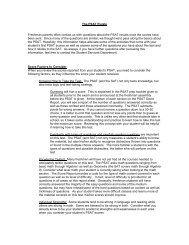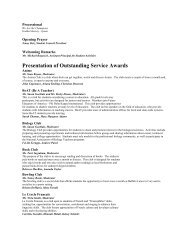The Crusader Newspaper - Cardinal Gibbons High School
The Crusader Newspaper - Cardinal Gibbons High School
The Crusader Newspaper - Cardinal Gibbons High School
You also want an ePaper? Increase the reach of your titles
YUMPU automatically turns print PDFs into web optimized ePapers that Google loves.
May 29, 2011<br />
Catholic versus American<br />
perspective on bin Laden<br />
Balancing loyalty to faith and country<br />
By Elly Williams<br />
Copy Editor<br />
Osama bin Laden’s death is a controversial<br />
topic for many because it has<br />
forced us to consider our loyalty to our<br />
faith and our loyalty to our nation.<br />
Should we as Catholics view his<br />
death through the eyes of a Catholic,<br />
or through the eyes of an American?<br />
While I’m glad his death brings relief<br />
and justice, it’s never okay to rejoice<br />
simply in someone’s death.<br />
When I first heard about bin Laden’s<br />
death, I didn’t fully realize what<br />
it meant. All I knew was that the man<br />
who orchestrated one of the most tragic<br />
events in America was finally dead,<br />
and the victims of 9/11 could have<br />
some small reward of justice after ten<br />
long years.<br />
It seems to be a difficult thing to<br />
process for Catholics, since the Catholic<br />
faith does not rejoice in the death<br />
of anyone, even an apparently evil person<br />
such as bin Laden. However, as an<br />
American, it’s so difficult not to rejoice<br />
and to feel proud the strength and intelligence<br />
of our nation prevailed.<br />
Living in such a privileged country<br />
as ours, we easily forget that people<br />
all around the world don’t have access<br />
to basic necessities that we take for<br />
granted.<br />
Water, for example, is so easily<br />
attained in the United States that<br />
it’s hard for many of us to imagine<br />
someone not having clean water, or<br />
simply not having enough water at all.<br />
When North Carolina was<br />
suffering from a drought last summer<br />
everyone tried to conserve water.<br />
Conservation sort of became a fad<br />
and for a few weeks everyone seemed<br />
to really care about it. Sadly, the fad<br />
ended when the drought ended, and<br />
most people returned to their waterwasting<br />
ways.<br />
Now that summer is here again,<br />
we should be even more conscious<br />
of our water use at all times, not just<br />
during droughts.<br />
Last summer, I went on a<br />
delegation to Nicaragua. For part of<br />
the time I was there, I stayed in a rural<br />
town called El Regadio. Our group<br />
Bin Laden rejoiced in his attack on<br />
America, and in the death of so many<br />
Americans. <strong>The</strong>refore, if we rejoice in<br />
his death, some people think we are<br />
no better than he is. I do understand<br />
the Catholic Church’s opinion, but it’s<br />
so hard to not be happy. While we as<br />
Catholics certainly rejoice in at least<br />
the relief his death brings us, it’s a difficult<br />
task to not feel happy in his death<br />
specifically.<br />
<strong>The</strong> families of the victims have<br />
every right to be happy—someone<br />
they love was cruelly murdered by this<br />
man. <strong>The</strong>y deserve a token of justice,<br />
no matter how small. While his death<br />
doesn’t end terrorist threats, it is the<br />
beginning of the end to them. That certainly<br />
brings relief not only for me, but<br />
also for my entire generation.<br />
<strong>The</strong> Bible says an eye for an eye.<br />
But Jesus says to turn the other cheek.<br />
It’s hard to determine which is right. I<br />
am glad he is gone because his death<br />
brought relief and justice, which I feel<br />
is long overdue.<br />
Official White House Photo by Pete Souza from www.whitehouse.gov<br />
President Barack Obama and Vice President Joe Biden, along with<br />
members of the national security team, receive an update on the<br />
mission against Osama bin Laden in the Situation Room of the White<br />
House, May 1, 2011. Seated, from left, are: Brigadier General Marshall<br />
B. “Brad” Webb, Assistant Commanding General, Joint Special<br />
Operations Command; Deputy National Security Advisor Denis Mc-<br />
Donough; Secretary of State Hillary Rodham Clinton; and Secretary<br />
of Defense Robert Gates. Standing, from left, are: Admiral Mike Mullen,<br />
Chairman of the Joint Chiefs of Staff; National Security Advisor<br />
Tom Donilon; Chief of Staff Bill Daley; Tony Binken, National Security<br />
Advisor to the Vice President; Audrey Tomason Director for Counterterrorism;<br />
John Brennan, Assistant to the President for Homeland<br />
Security and Counterterrorism; and Director of National Intelligence<br />
James Clapper. Please note: a classified document seen in this photograph<br />
has been obscured.<br />
As summer approaches,<br />
it’s time to conserve again<br />
By Moira O’Neill<br />
Executive News Editor<br />
brought our own water to drink, but<br />
showering was a different story. My<br />
host family had running water, but they<br />
didn’t have it 24-7. <strong>The</strong>y also didn’t<br />
have a sink, so any water they needed<br />
came from a hose. Buckets of water<br />
and the river were my only options<br />
when it came to showering. Staying in<br />
El Regadio, even only for a few days,<br />
really changed my perspective on<br />
water.<br />
We all have heard how to conserve<br />
water: take shorter showers, turn of<br />
the water when you brush your teeth,<br />
install low-flow shower heads, the list<br />
goes on and on.<br />
<strong>The</strong> problem isn’t that people don’t<br />
know how to save water. <strong>The</strong> problem<br />
is that for some reason people don’t<br />
care. All around the world people die<br />
because they don’t have clean water,<br />
and here we complain when we can’t<br />
water our lawns.<br />
It’s time to appreciate the natural<br />
resources we have, and make sure<br />
we’re using them wisely.<br />
Next time you turn on a faucet,<br />
think about it.<br />
This article first appeared in the<br />
October, 2010 issue.<br />
Opinion & Editorial<br />
By Karthik Sundaram<br />
Contributor<br />
<strong>The</strong> <strong>Crusader</strong> 5<br />
Rethinking U.S. foreign policy<br />
now that bin Laden is gone<br />
U.S. should work with all nations<br />
Many in the U.S. celebrated the<br />
death of Osama Bin Laden, the leader<br />
of Al-Qaeda. Now some pundits are<br />
using the U.S. government’s accomplishment<br />
as a springboard to reevaluating<br />
the U.S. presence in Iraq and Afghanistan.<br />
In light of this, it is perhaps important<br />
to assess U.S. foreign policy in the<br />
Middle East with respect to its ubiquitous<br />
military intervention.<br />
While the death of Bin Laden and<br />
the institution of democracy in Iraq<br />
exemplify how the strong arm of the<br />
U.S. seems to achieve its ambitions, we<br />
must not overlook the negative consequences<br />
of the War on Terror.<br />
Our nation has not only experienced<br />
the physical and emotional loss<br />
of over 5,000 soldiers but also suffers<br />
a price tag nearing $1.5 trillion since<br />
2001. In addition, the U.S’s failure to<br />
acknowledge a higher world authority<br />
contributes to political turmoil globally.<br />
By neglecting to wait for a U.N.<br />
Security Council resolution to engage<br />
in armed conflict in Iraq, the Bush administration<br />
effectively damaged the<br />
backing of its allies and opened the<br />
door for other nations to defy global arbitration<br />
and to act entirely of its own<br />
accord. In short, our government’s use<br />
of military in the Middle East accomplishes<br />
its own goals yet is quite clearly<br />
outweighed by economic and political<br />
repercussions.<br />
While it is apparent that complete<br />
aggression isn’t the answer, the right<br />
balance of military interference seems<br />
to tip near none. By December 31 of<br />
this year, all U.S. troops will be withdrawn<br />
from Iraq in accordance with an<br />
agreement between the Iraqi and U.S.<br />
governments.<br />
So the U.S. is headed for the polar<br />
opposite in terms of its original military<br />
intervention in Iraq, which did<br />
ultimately result in the removal of Saddam<br />
Hussein’s dictatorship and established<br />
the representative democracy in<br />
place currently.<br />
<strong>The</strong> withdrawal of U.S. troops solidifies<br />
the Iraqi government as an ally<br />
by acknowledging it as an independent<br />
state and at least doesn’t perpetuate<br />
anti-American sentiment among the<br />
Iraqi populace.<br />
It is because of these respective<br />
benefits, the U.S. policy in Afghanistan<br />
should also shift to match that of Iraq:<br />
let’s withdraw our troops as soon as<br />
possible.<br />
<strong>The</strong> issue with withdrawing from<br />
Afghanistan, however, is that groups<br />
similar to the oppressive nature of<br />
Saddam’s regime, such as the Taliban,<br />
pose a threat to U.S national security<br />
as well as that of numerous other nations.<br />
So instead of taking matters into<br />
its own hands yet again, our government<br />
should work to achieve a U.N.<br />
consensus on the future and security of<br />
Afghanistan.<br />
It is a natural tendency for nations<br />
to follow their own agenda, yet this is<br />
realistically only possible for the countries<br />
with the power to do so. And of<br />
those few powerhouses that are able<br />
to pursue their self-interest, other nation’s<br />
expectations could limit these<br />
seemingly imperialistic attitudes.<br />
Russia’s veto of sanctions against<br />
Libya a few months ago in the U.N.<br />
Security Council due to its economic<br />
self-interest clearly demonstrates the<br />
self-concerned mindset, which can be<br />
attributed to the U.S., not only in its<br />
policy in the Middle East, but also its<br />
foreign policy globally.<br />
By working with the U.N. and other<br />
nations, the U.S. would ultimately<br />
be setting a precedent for the rest of<br />
the world and would eliminate, or at<br />
least mitigate, the tendency of states to<br />
act primarily in its own interest.<br />
Address obesity<br />
with mandatory athletics<br />
Advantages outweigh risks and rights<br />
By Donna Steinbacher<br />
Copy Editor<br />
<strong>The</strong> widespread and major issue of<br />
overweight and obese high school students<br />
is a very real problem. Many solutions<br />
have been proposed and some<br />
have been put into action to help solve<br />
this crisis.<br />
Despite these efforts the fact remains<br />
that in 2008 17% of children<br />
ages 2-19 were obese and no doubt<br />
that number is growing. Along with<br />
trying to get cafeterias to serve healthier<br />
food, another fix could be requiring<br />
every high school student to participate<br />
on a sports team.<br />
Why should this be part of education?<br />
Being on a team teaches values<br />
and lessons that are just as important<br />
as those taught in the classroom when<br />
it comes to living in the real world.<br />
First, it will keep teens in shape<br />
and teach them how to stay in shape,<br />
which can prevent obesity when they<br />
are young and when they become<br />
adults. This is not the only advantage<br />
though. Being in shape and not being<br />
obese is bound to raise student’s confidence<br />
and sense of self-worth.<br />
In addition to this, being on a<br />
team teaches many things other than<br />
just physical health. Playing on a team<br />
teaches you how to work with other<br />
people and how to put your trust in<br />
some one else to do what they are supposed<br />
to do. It also teaches teens how<br />
to put themselves out there and learn<br />
to accept that it is okay to fail at something<br />
as long as you learn from it and<br />
put yourself right back out there again.<br />
Being on a team teaches that success<br />
cannot come without discipline<br />
and hard work. Along with building<br />
character and teaching life lessons,<br />
playing on a team builds friendships.<br />
I understand that people may<br />
think that this idea would be a violation<br />
of personal freedom but some<br />
kind of physical education is required<br />
if the problem of obesity among the<br />
young is going to be fixed.<br />
I know that not everyone is very<br />
athletic or great at sports but more<br />
teams than just varsity and junior<br />
varsity could be made so that everyone<br />
can play even if they are not great<br />
at the sport. This will also help teach<br />
young people about how you must always<br />
work to make yourself better.<br />
For students who have other responsibilities<br />
such as a job or taking<br />
care of a younger sibling there could<br />
be multiple practice times in order to<br />
accommodate these responsibilities.<br />
Altogether, the advantages of requiring<br />
participation in a team sport<br />
greatly outweigh the disadvantages<br />
and would be very beneficial to implement<br />
in schools.<br />
Page design by Op-Ed Editors Rachel Pratl and Matthew Burnette













